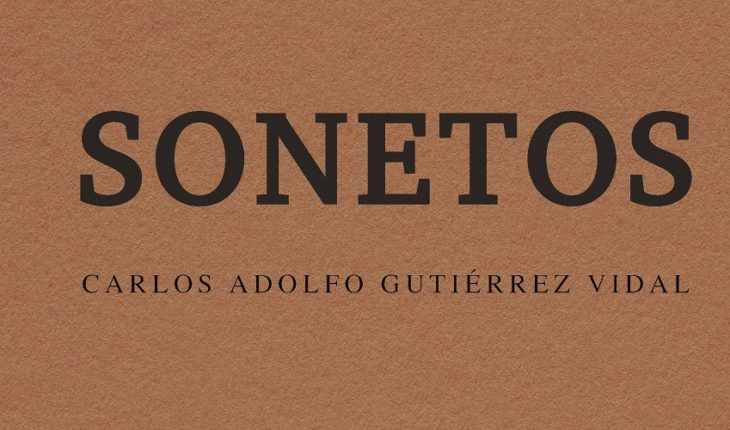Narrating the daily life of having a coffee or nostalgia is what the poet Carlos Adolfo Gutiérrez Vidal captures in a new book, Sonnets.
“I am of the idea that poetry is not written, felt and perceived first. Part of a different perception of reality through collective consciousness.”
With this idea, Carlos Adolfo took a series of 19 sonnets of his own, printed them and began to build a 100% artisanal poem where he narrates and reflects the social details in Mexico that go from the everyday to the erotic.
“I never considered doing a sonnet’s poem. I’m a middle-aged man with written sonnets and I wasn’t going to wait for a publisher to publish me or put it in a contest when I can do it.”
The author of Sonnets said that at 45 he decided to do the same as when he was 17, writing poetry, only now he created his own book autonomously with a first print of 300 copies.
“I did it all myself. I printed, bounded, greased, folded, conpaginé. All the leaves I touched and I liked that metaphor because the sonnet allows to touch others, that is, it touches a lot of people, they are easy to read and easy to share.”
Vidal began his career as a writer and poet in the border town of Mexicali, Baja California, from where he is originally from. His first publications appeared in local newspapers when he was 16. By 1992, after coming of age, they published one of their books in Tierra Adentro.
“I am one of those first rounds that he published in Tierra Adentro and in 1993 the book comes out; gradually the others came out,” he said in an interview for Animal Político.
His first book was published during the first semester of the communication career he presented at the Guadalajara Book Fair. He has been living in Mexico City for 12 years and has worked in the Cloister of Sister Juana for 12 years.
In his career as a writer he has had the support of the National Fund for Culture and the Arts (Fonca), and obtained an exchange grant of Artistic Sciences in Canada where he wrote another book.
For Carlos Adolfo, poetry is more an ancient form of language than a literary genre. “Poetry itself in its oral form and in its construction is just as old as the numbers.”
“Poetry is an opportunity to tell the world from the everyday find,” he said.
The artistic life of Carlos Adolfo in Mexicali had an important point in the 90s, it was a very important decade with the creation of new projects such as Tierra Adentro.
This cultural movement that began to emerge in Baja California in cities such as Mexicali, Tijuana, Ensenada, Tecate and Rosarito generated a local scene that allowed the emergence of various projects of different kinds from film, musical projects such as Nortec Collective, and documentaries.
“The 1980s were very important in terms of cultural creation, as was the 1990s in Baja California with a full generation like Jorge Ortega and Heriberto Yepes.”
For Carlos Adolfo, the most important part of living on the border was facing the challenge of language by being exposed to the English language on a constant basis, in addition to the theme of cultural shock that produces the need to create new forms that do not have artists from other regions for not being in this part of the country.
“The notion of the geographical space associated with the social space that produces the dynamics of the border itself, whether or not you write themselves the subjects of the border, is to be in an area besieged by threats, drug trafficking, organized crime and social problems related to migration, the subject of deportees, drug use, racism and language in the face of access to the other country’s cultural offering where one feels the freedom to experience that, in reality, northern Mexico is less formal than the rest of the country,” he said.
Sonnets it is a book that can be acquired in the author’s presentations or directly with him through the Twitter account @carlosgvidal.
Political Animal with authorization from the author gives you five of the sonnets of the book.
What we do in Animal Político requires professional journalists, teamwork, dialogue with readers and something very important: independence. You can help us keep going. Be part of the team.
Subscribe to Animal Politician, receive benefits and support free journalism.#YoSoyAnimal
translated from Spanish: Sonnets, talking about social problems from daily life
September 21, 2019 |





